How To Choose a Domain Name – Top 10 Tips & Tools for 2024
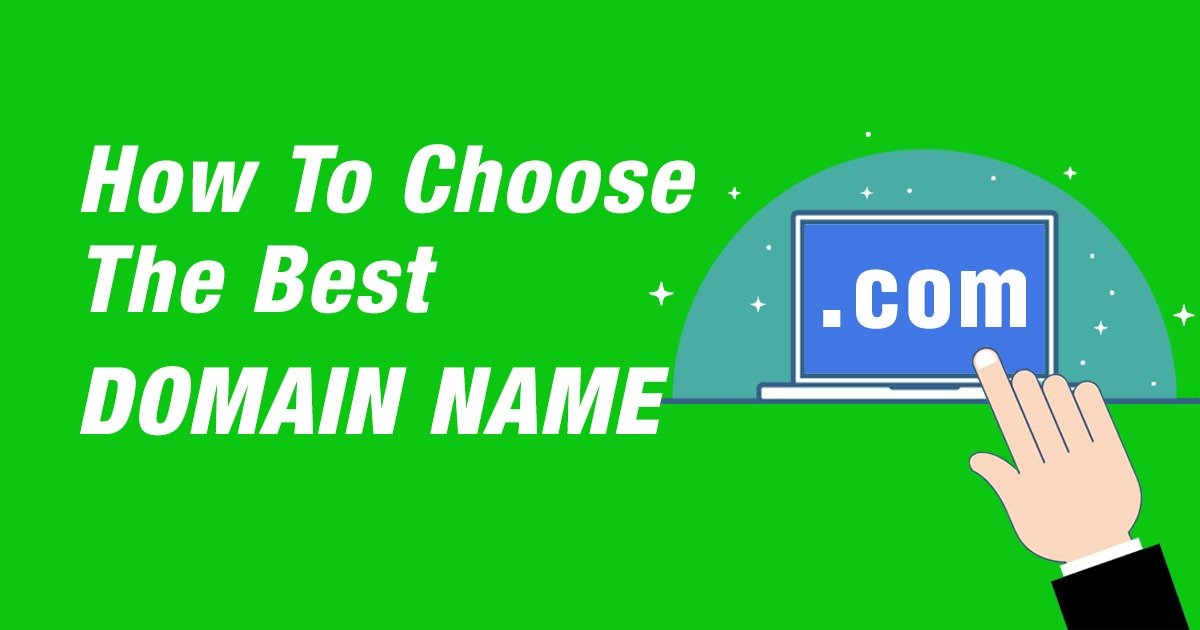
Do you want to know the best tips for how to choose a domain name?
Well then, you’re in luck, because in this article I’m going to show you exactly how to do that, with my top 10 tips for picking a great domain name for your new blog or company’s website.
In theory, registering a name should not be that big of a deal, but with so many registered domain names out there, it has become increasingly more difficult to pick a great name for your new website.
There are over 342 million domain names that are already registered as of December 2018 (source: Verisign data) and the list is constantly growing with over 150,000 domain names registered every single day.
So let’s get started, here are my top tips for how to choose a domain name for your blog or website:
1. Always go for the .com

Rule no. 1: Always try and get the .com extension. Okay, it’s not really a rule, it’s just a tip, but here’s why you should always aim to get a .com:
When it comes to domain names, pretty much everyone knows that the .com extension is KING. Out of all the 342 million domain names registered, the .com is the leading extension with over 137.6 million registrations, compared to .net with only 14.1 million registered domain names.
So as you can see, .com is and will always be the absolute TLD (top-level domain) king, and the data backs this up.
Now forget about the data, let’s think about all the adverts you’ve seen online or offline in real life, at the Superbowl ads or on the radio, how many times have you heard: Visit our website at www.Example.com versus Example.net? That’s right, most of them are .com
People are already too familiar with .com to such an extent that some of them will not even trust your website if it doesn’t end in a .com. Do you know how many times I did not want to order something from a website that had an extension like .biz or .info?
To me, a .biz or .info or pretty much anything else other than a .com (and rarely accepted: .net and .org) will always scream: scam or laziness, and I have issues from ordering stuff from those sites. I know, I know I’m a monster, but hey… it’s just my opinion…
If you’re having a blog or you’re running any type of business, you should always focus on registering a .com, anything else, does not inspire trust, value, and creativity.
Yes, it’s a bit harder now to register a good .com domain but it’s still doable, especially if you’re following some of these tips inside this article.
2. Keywords matter (somewhat)
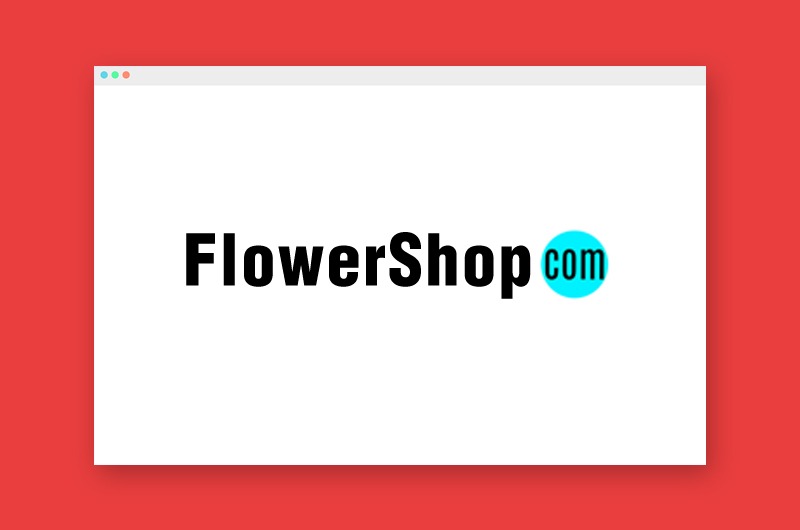
Here’s the thing, a few years back, people would be able to rank websites on the first page of Google with simply having exact match keywords into their domain name.
So, for example, someone who had a domain name like BestAndroidPhones.com would have a much easier time to rank in search engines for the term: “Best Android Phones” than someone with a domain like Tech21.com.
Many people (including myself) were able to quickly rank these exact match domain websites and affiliate blogs with competitive keywords in a short amount of time without that much SEO work, simply because they had a great aged domain with the keyword in it.
Nowadays things have changed, Google and other search engines have become much wiser, and they’ve put a stop to this tactic.
John Mueller who is the Senior Webmaster Trends Analyst at Google, said a few time ago that having keywords in your domain name will not automatically make it rank better than your competition or a brand domain name.
But even so, keywords in your domain address might still have an impact when it comes to SEO, sure it won’t be the same as before, when all you had to do was register an exact match keyword domain name, BUT it will make it a bit easier for the search engines to figure out what your website is all about.
So now, you will have to put in the work if you want your website to become successful and receive good rankings in the search engines, that means having good content, and doing on-page, and off-page SEO, and if you combine that with some good keywords into your domain name, then your site will be able to rank very well.
Also, having a keyword into your domain name will make it much easier for people to instantly understand what your website is all about. It’s much easier to understand a website with the domain name: FlowerShop.com versus something like 39Roses.com
But never overdo it, or else you risk to have your domain name sound too generic and many people won’t remember it.
So here are some examples:
These are two good domain names for a flower shop:
- FlowerShop.com
- FlowerShopNYC.com
These are bad, they are too generic & too long:
- CheapFlowersForAll.com
- BuyCheapFlowersNow.com
3. Keep it short and simple

Now, the length of the domain also has an important role when picking the right domain name for your new blog or business.
Continuing from the example above, you should keep in mind that keywords do matter, and they can help with SEO and make it easier for people to remember your website.
However…
Don’t go crazy with it and make your domain name too long. Not only will this make your domain name look spammy and less credible but it will also make it harder for people to remember it or even worse they can enter a letter wrong and be taken to a completely different website.
So, my recommended domain name length is a maximum of 15 characters. I usually keep it even lower than that, but sometimes domain names can be pretty tough to register, especially a good .com so then I will have to go longer, but never over 15 characters.
Take this blog, for example, NetHustler.com (10 characters) you see how short and how easy it is to remember it?
Sure I could’ve gone with something like InternetMarketingHustler.com or InternetMarketingTips.com or MakeMoneyOnlineTips.com but those don’t look good and are not brandable, they are also not easy to remember or to manually type into the browser address bar.
Bottom line: It’s great if you can have a domain length that is on the short side.
4. Don’t use numbers and hyphens
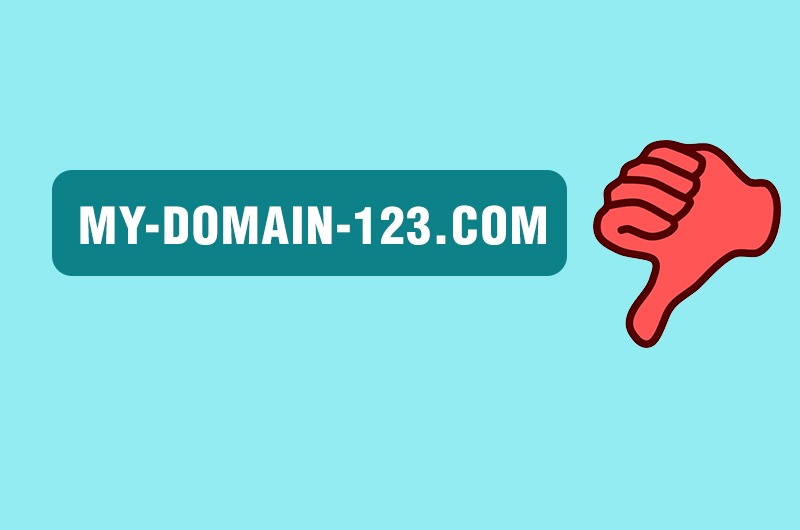
This one is pretty much a no-brainer guys, try as much as possible to avoid using numbers or hyphens in your domain name.
The reasons are pretty simple actually. The domains don’t inspire trust and credibility, it’s not easy to remember, and it straight up looks amateurish plus a big one is the fact that your users might be going to your competitor’s website if they forget a number or a hyphen.
So, for example, Best-Flower-Shop.com is not good because visitors can easily go to BestFlowerShop.com by mistake for simply not adding in the hyphens.
It’s the same with numbers too, what if you have the domain name: 1GoodPizza.com, and your visitors end up on OneGoodPizza.com? See how that is confusing and can easily hurt your business? Sure you could always buy both the domain names, but it’s highly unlikely that you will find both of them available at the same time.
So yeah, avoid numbers and hyphens in your domain name, unless your actual brand or company has a number in it for example 7-Eleven.
5. Choose a brandable name

While it’s good to have keywords in your domain name, sometimes it’s more important to build a brand.
Now obviously this depends on the website you will be building, but in general, you will want to give your website or blog a unique and brandable domain name that it’s also easy to remember.
Let’s see some examples:
- Facebook vs SocialNetworkSite
- Google vs SearchEngine
- Amazon vs BuyBooksOnline
- Apple vs PersonalComputers
- Intel vs ChipProcessors
- YouTube vs WatchOnlineVideos
See anything similar there? All these big brands don’t use generic names for their companies or websites.
Instead, they focused on having a name that’s unique, highly brandable and easy to remember by users and customers.
So yeah, you should try and do the same and find a good brandable domain name for your business.
But make sure you do a check on Google to see if there are any companies that are in the same niche/category as you so that you can avoid using a trademarked name.
6. Use domain name generators
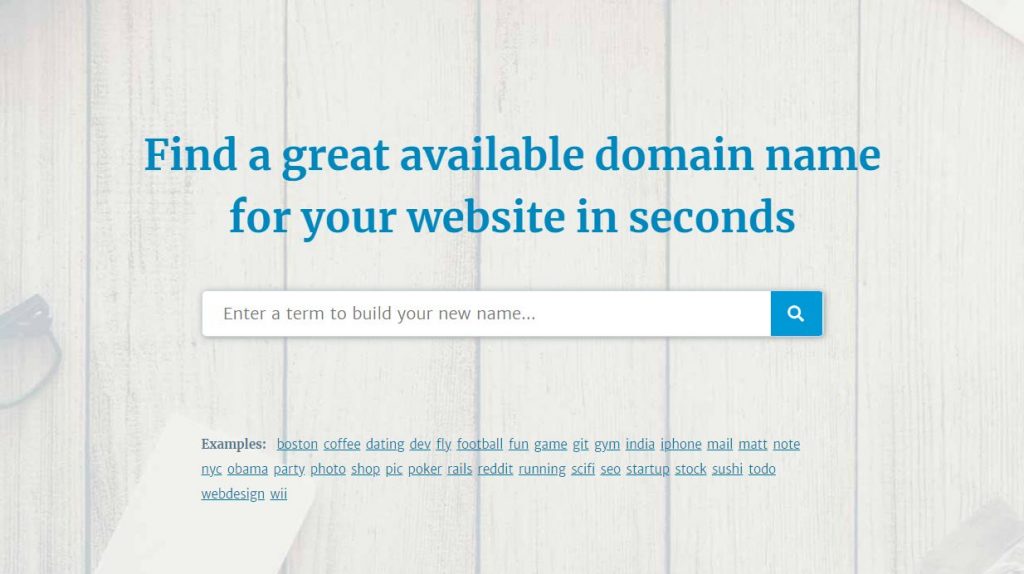
Ok, so I know that coming up with domain names can be hard, especially if you’re trying to get a good .com since most of them are pretty much taken these days, but don’t worry there’s still hope.
If all your desired domain name ideas are already registered, and you feel that you’re stuck, you can always get some extra help by using some tools that we call domain name generators.
These digital marketing tools are pretty simple to use and also free, and they all have one thing in common: Finding you the perfect domain name that is available to be registered.
You just select your TLD (.com preferably) and if the generator has other options such as adding a keyword etc, then do that too, and in a few moments you will have a list of available domain names that you can register, if you don’t like them, you can try again using different settings or just try a new domain name generator from the list below.
List of domain name generators that I like:
7. Always research the domain name

After you’ve come up with a few ideas for your domain names that are available to be registered, you should try and do a bit of research on them to see if they have a trademark or if the previous owners did some “nasty” things with their website that blacklisted the domain name from search engines.
So first, to check if your domain name is similar to a business that is already trademarked in the US you can go ahead and do a search here.
In order to avoid a big mess in the future with potential lawsuits and all that bad stuff, you should try and avoid registering domain names that are too similar to brand names that are trademarked especially if you both operate in the same category.
Basically, almost all the domain names have been registered at some point in the past, so the chances are that the domain name you’re trying to register has already been used by somebody else in the past.
This sometimes means that the past owner might have posted illegal things, or adult stuff, scams, spammed, etc…thus Google and other search engines blocked it from ever appearing in the search engines ever again.
So to avoid getting a “bad domain name” you should do a few checks on google with the name you want to registered for example BobsFlowers.com or BobsFlowers, “BobsFlowers”, “BobsFlowers.com”, “Bob’s Flowers”
You can also do this search: site:BobsFlowers.com and if nothing comes up, there might be a chance that Google removed it from its search engines.
Although in some cases, if nothing shows up it just means that the domain name/website did not have content on it ever or in a long, while so Google never indexed it in the first place, so yeah it’s a bit of a gamble.
Another trick is to go and check the Wayback archive machine, basically, this is an online library database that has snapshots of millions of websites, and how they used to look and what content they had in the past, so you can clearly see what the domain name was used for.
Check out the whois history too, if you want to do a more in-depth search of the domain’s past.
8. Act Fast & Register Your Domain
Ok, so by finishing reading this article you probably learned by now a few tips on how to choose a domain name that is good for you and your business. If the domain name is available to be registered, you should act fast and register it quickly before someone else gets the chance to get it before you.
It doesn’t happen that often, but trust me sometimes it does.
For instance I had 3 domain name ideas for a blog of mine that I started a while back, out of the 3 domain names, I had 2 that were really good and couldn’t decide between them, so I said it’s best to take some time off, do some other things and then come back and see which one I like the best.
Sure enough, after I went bicycling through the town for a few hours, I found out that the domain that I liked the most has just been registered by someone else.
I was so furious that I decided to register the other 2 domain names and use the one that I liked the most to build my blog and the other one to redirect to it, just in case I couldn’t decide between them and risked the chance to get one of them registered by someone else again.
So yeah, if you like a domain more than the others, go ahead and act fast and register it before someone else does.

My favorite domain registrar is NameCheap (See The Best NameCheap Promo Deals Here)
The reasons for going with NameCheap are simple, they are cheaper than GoDaddy and other domain name registrars, they are well known and have been in the business since 2001.
Their support is amazing and fast, and they offer FREE Whois privacy for every domain name registered through them and their renewal prices are also low beating GoDaddy and the rest of the registrars.
I had over 50 domain names registered on GoDaddy and Name.com, I’ve transferred all of them for free to NameCheap a while back, and I never looked back.
You can also register your domain name if you sign up for a hosting plan such as BlueHost, you get your domain name for free once you sign up for their hosting service.
You need hosting anyway, so if you want to have a smooth time and everything set up quicker, then you could just register your domain name through the hosting company that you will use for the website.
I also recommend BlueHost, because you get a free domain name with your hosting.
9. Buy a domain name from an auction

If you’re still looking for ideas and you’re still searching for the perfect domain name, then maybe it’s time for you to look through some domain name auctions and try and purchase a premium domain name at a higher fee of course.
Most of the time, people will be perfectly fine and get a domain name that they like if they just do a bit of work and know-how to properly search for them (like using some of the tips in this article for example).
But…there are times when you are simply not satisfied with the selection of domain names that are available to register at a minimal fee by yourself.
Sure, you could always register your domain name on a .net (less popular than a .com but still widely used) and maybe even a .org (good if you are a non-profit business, church, NGO, etc).
But if you have a little more funds to spend than $10 a year, then your next best thing is to go ahead and buy a domain name that you like from a domain seller or from a domain marketplace.
Usually, a lot of premium domain names are available to register, but at a much higher price, so instead of paying $10, you will have to buy it for like $500, $1000, $1500, $5000, $20,000, etc… you get the point…
It’s all about how good the name is, how short it is, what it means if it’s highly brandable etc…
There are people/businesses that buy lots of domain names, that sound good and are brandable and then just sell them again at a higher fee.
So there is nothing you can do other than to pay them that high fee that they ask for, or just keep on looking and searching for a domain name that you can find on your own and just pay $10.
There are also websites that are so-called domain name marketplaces, and sometimes even the domain registrars themselves are selling premium domain names at a higher fee, and you can either buy them directly from them or from other people that are putting their domain name on auction waiting for the highest bidder.
Some good places where you can buy premium domain names from:
Again though, this isn’t something that you have to do, unless you have a bigger budget to spend on a domain name and you really really want a specific domain name.
Most of the time you can find a good domain all on your own, so you won’t need to spend more than $10 or so a year to get one.
10. Register additional extensions

Once you have registered your domain name, let’s say it’s: example.com if you have the money, you should probably register other extensions too, like example.net, example.biz, example.org, example.co etc…
Yes this will increase the costs, and you will probably have to pay $50 – $60 a year in domain renewal fees, but then again, if you have a great business and you don’t want anyone else to mess with it, by registering a domain name similar to yours but on a different TLD, then you should invest in buying more domain extensions and just redirect all of them to your main website.
Again, this is not something that you should do, it’s more a recommendation for bigger businesses, but it’s still something you should have in mind.
For example, Google has registered: Google.net, Google.info, Google.co, Google.cc, Googel.com, Gogole.com and many many more.
They all redirect users to the main: Google.com domain name, but they bought all of them because they didn’t want other people to run phishing and scamming websites and tricking people into thinking they are actually on Google when in fact they were getting scammed and hacked.
Another good reason is if your competition buys yourdomain.net and you have yourdomain.com, and they run a website talking bad things about your business or simply just redirect the traffic to their own main website address.
So you see, there are a few advantages to own more extensions than a .com
Extra Tips
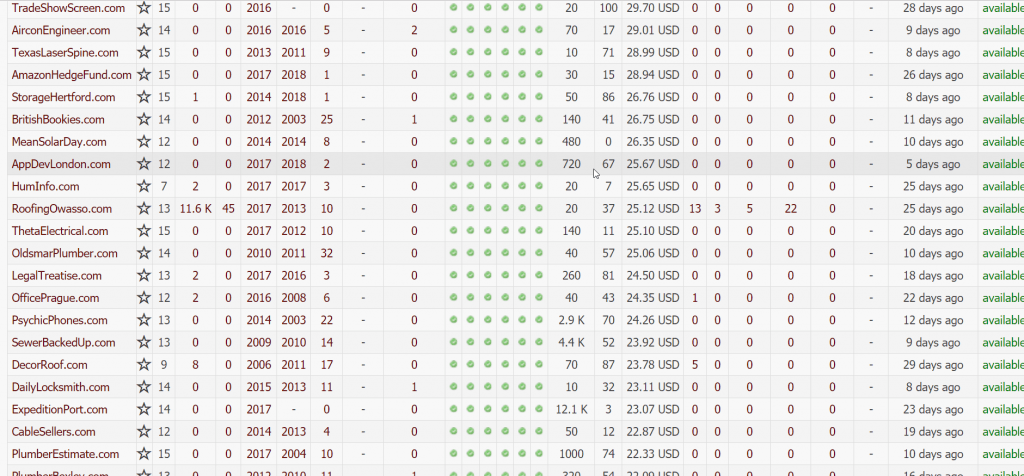
Use ExpiredDomains.net if you are lost and need a ton of ideas. This site is good for finding domain names that are expiring or that expired, basically, these are domains that people forgot or did not want to renew anymore so they are now available for others to register.
I will have a bigger tutorial on how to use ExpiredDomains.net for this kind of purpose soon, but for now, you can just go ahead and try it out and see if you can manage to find some domain name ideas.
It’s a bit more complicated than a regular normal domain name generator, so you have many more options to fiddle with, but all in all, it’s pretty straight forward and you can figure it out as you go.
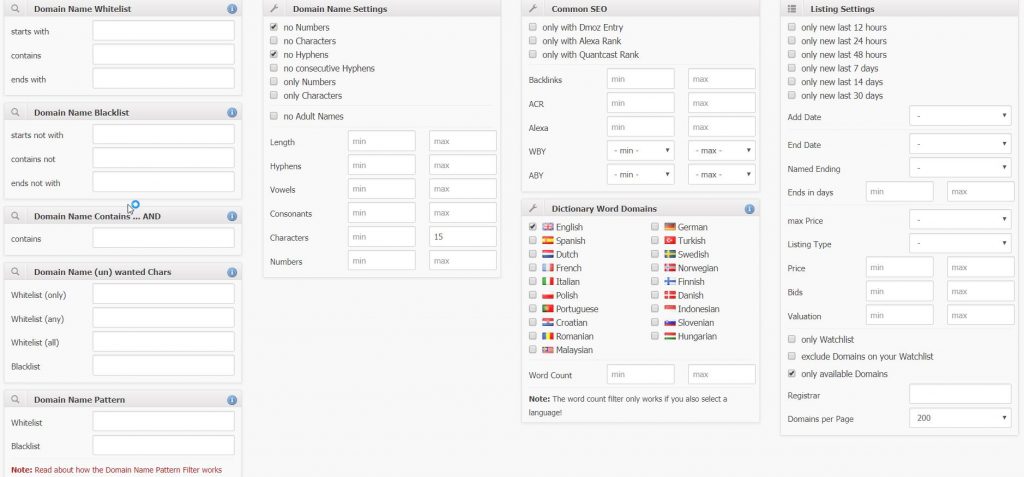
Check out the .com section if you only want to see .com, open the filters and use the “Available domains only” to see domains that are not registered yet, and you can use a bunch of other stuff to filter your results even more.
My second extra tip: Use Namecheckr.com to quickly check and find domains and social usernames that are available on multiple social networks such as Facebook, Twitter, Reddit, Slack, Instagram, Youtube, etc.
I hope these tips on how to choose a domain name will help you out, and if you liked some of these tips or if you have any questions let me know by leaving a comment below.
Check out the latest NameCheap Coupons & Promo Deals







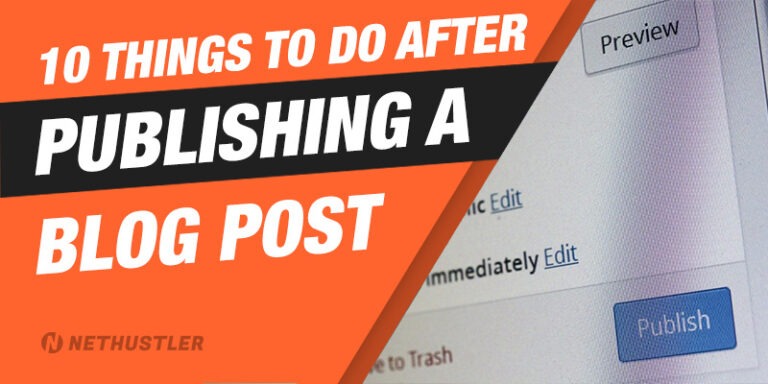
Great comprehensive list. I recommend to anyone stick with the .com as much as possible and try to keep it short and snappy so it’s unique and people remember it.
You mentioned buying premium domains and I know you touched on expiring domains but just to add to it, another bit of advice I’ve learnt over the years to get a great domain name is consider looking at domain expiring websites that you can search and from there you can find the domain you want and then you can use a drop catching service to grab that domain. This would A. give you the domain you want and B. there is a good chance that domain is aged and Google is happy with it and C. a much higher chance of it being a premium domain without the additional cost.
Also I’m not sure if you addressed it but it pays to make sure the domain (blog name) you’ve chosen won’t be affected by copyright or trademark otherwise searching for a name might end up being a waste of time.
Hi Andy,
Thanks for reading the article and for the tips, although I wrote a bit about expired domains and avoiding copyright and trademarks in the article, I should probably go more in-depth in the next update.
Cheers,
Stephen
Suppose a person takes a domain name such as learncode.com and subsequently another takes a domain as learncode.in will it give rise to any infringement of the business name of the person owning the .com TLD.
Hi there,
This is a bit tricky, it all depends on the name really if its something generic like HowToLoseWeight.com then I don’t think you will have a problem, it’s important to check if they have trademarked the name because that can give you a few issues though.
In general, I stay away from buying domain names on another extension other than .com simply to avoid this issue, also I really want to stand out from the competition so I always try to create a brand with its own identity in any niche, I would suggest you try to do the same, just to avoid the hassle down the road.
You can also contact a lawyer I guess since I’m not really familiar with this side of the law if you want to be sure. But in reality, it’s just easier to come up with a new name and possibly on .com, heck go for 3 words domain names if everything else fails.
Best of luck,
Stephen
I won’t forget wat I learnt here today